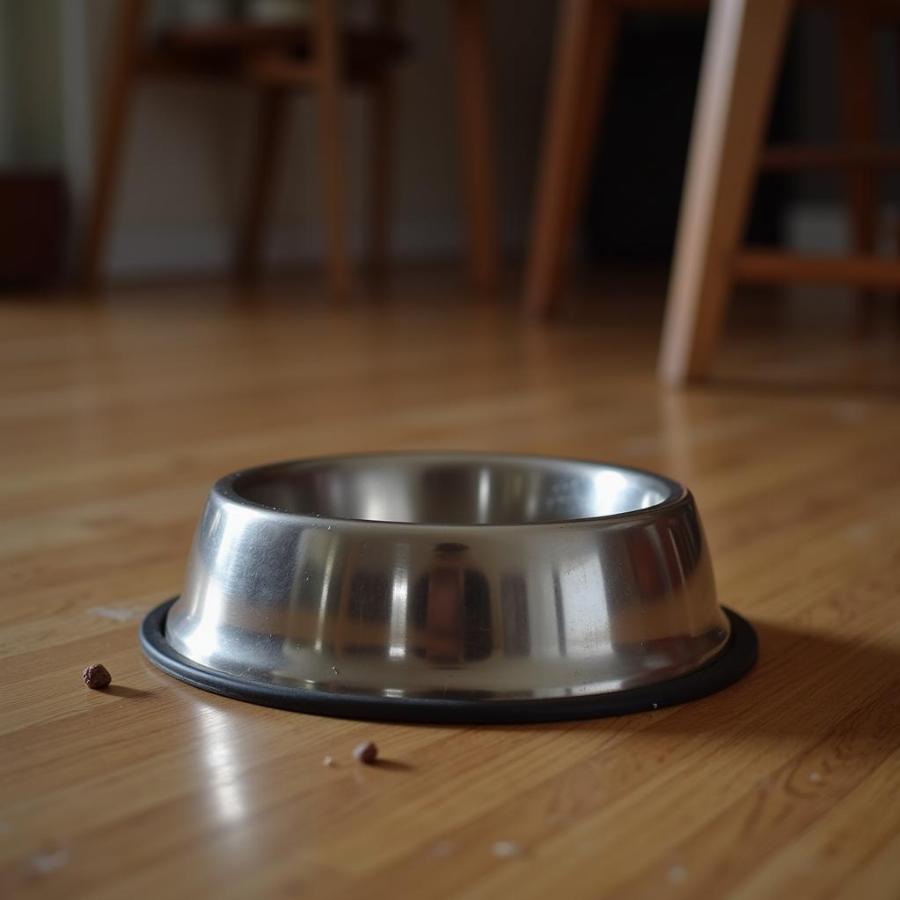Waking up to the unpleasant surprise of your dog throwing up in the morning can be concerning. While occasional vomiting might not be a cause for alarm, frequent morning vomiting could indicate an underlying health issue. This comprehensive guide explores the common reasons behind your dog’s morning sickness and provides helpful insights to address the problem.
Common Reasons for Morning Vomiting in Dogs
There are several reasons why your furry friend might be throwing up in the morning. Some of these reasons are harmless and easily remedied, while others may require a trip to the vet. Here are some of the most common culprits:
1. Empty Stomach (Bilious Vomiting Syndrome)
One of the most common reasons dogs vomit in the morning is an empty stomach. When the stomach remains empty for an extended period, bile, a digestive fluid produced by the liver, can build up and irritate the stomach lining. This irritation can lead to vomiting a yellow or greenish foam, often referred to as bilious vomiting.
 Empty Dog Bowl
Empty Dog Bowl
Dogs who eat only one meal a day or have long intervals between meals are more susceptible to bilious vomiting syndrome.
2. Eating Too Quickly
Just like humans, dogs can experience indigestion if they eat their food too fast. When a dog gulps down its food, it also swallows a significant amount of air, leading to bloating and discomfort. This discomfort can trigger vomiting, especially if it occurs soon after eating.
To address this, consider using puzzle feeders or slow-feed bowls. These tools encourage your dog to eat more slowly, promoting better digestion.
3. Dietary Indiscretion
Dogs are naturally curious creatures, and their curiosity often extends to what they put in their mouths. Unfortunately, this can lead to them ingesting something they shouldn’t, such as garbage, spoiled food, or toxic plants.
If your dog vomits in the morning and you suspect they may have eaten something they shouldn’t have, it’s essential to monitor them closely for other symptoms, such as lethargy, diarrhea, or loss of appetite.
4. Food Allergies or Intolerances
Just like humans, dogs can develop allergies or intolerances to certain ingredients in their food. Common culprits include beef, chicken, dairy, wheat, and soy.
If you suspect your dog might have a food allergy, consult your veterinarian. They can help you determine the offending ingredient and recommend an appropriate diet change.
When to Worry: Serious Causes of Morning Vomiting in Dogs
While most cases of morning vomiting in dogs are benign, some can indicate a more serious underlying health condition. If your dog’s vomiting is persistent or accompanied by other symptoms, it’s crucial to seek veterinary attention immediately.
Here are some potentially serious causes of morning vomiting in dogs:
- Gastrointestinal Obstruction: This occurs when an object gets lodged in the stomach or intestines, preventing food from passing through.
- Pancreatitis: This is an inflammation of the pancreas, an organ that plays a crucial role in digestion.
- Kidney Disease: Diseased kidneys may struggle to filter waste products effectively, leading to a buildup of toxins in the bloodstream.
- Liver Disease: The liver is responsible for detoxifying the body, and liver disease can disrupt this process.
Tips to Prevent Morning Vomiting in Dogs
Preventing morning vomiting in dogs often involves making simple adjustments to their routine and diet.
- Feed Your Dog More Frequently: Instead of one large meal, divide your dog’s daily food ration into two or three smaller meals. This helps prevent the stomach from becoming overly empty and reduces bile buildup.
- Make Dinnertime Later: Feeding your dog their last meal of the day closer to bedtime can minimize the chances of their stomach being empty in the morning.
- Switch to a Different Food: If you suspect a food allergy or intolerance, consider switching to a high-quality, easily digestible dog food that is free from potential allergens.
- Elevate Your Dog’s Food and Water Bowls: Elevating the bowls can make it easier for your dog to swallow and digest food, reducing the risk of vomiting.
Why Does My Dog Throw Up Every Morning? FAQs
Here are some frequently asked questions about dogs throwing up in the morning:
1. What does it mean if my dog throws up yellow bile in the morning?
Yellow bile in vomit usually indicates an empty stomach. It’s often a sign of bilious vomiting syndrome, which can be managed by adjusting your dog’s feeding schedule or providing a small snack before bedtime.
2. Should I be concerned if my dog vomits once in the morning and then acts normal?
A single episode of vomiting isn’t usually a cause for concern, especially if your dog seems otherwise healthy. However, it’s essential to monitor them for any other symptoms.
3. Can anxiety or stress cause morning vomiting in dogs?
Yes, anxiety and stress can manifest physically, and vomiting is a possible symptom.
4. When should I take my dog to the vet for morning vomiting?
If your dog vomits frequently, experiences persistent vomiting, or shows other symptoms like lethargy, diarrhea, blood in vomit, or loss of appetite, seek veterinary care immediately.
5. Can I give my dog over-the-counter medication for vomiting?
It’s not recommended to give your dog any medication without consulting your veterinarian.
Help Your Dog Feel Better
Dealing with your dog’s morning sickness can be worrisome, but understanding the common causes and solutions can help you address the issue effectively. Remember to consult your veterinarian for an accurate diagnosis and treatment plan.
Want to learn more about dog health and wellness? Check out our article on [dog keeps throwing up white foam](https://beautdogs.com/dog-keeps-throwing-up-white foam.html) for more information.
About Beaut Dogs
Beaut Dogs is your one-stop resource for all things dog-related, offering trustworthy and insightful information about the canine world. Our website provides comprehensive guides on various dog breeds, health care, nutrition, and training. Need personalized advice? Contact us at [email protected], and our team of experts will be happy to assist you.